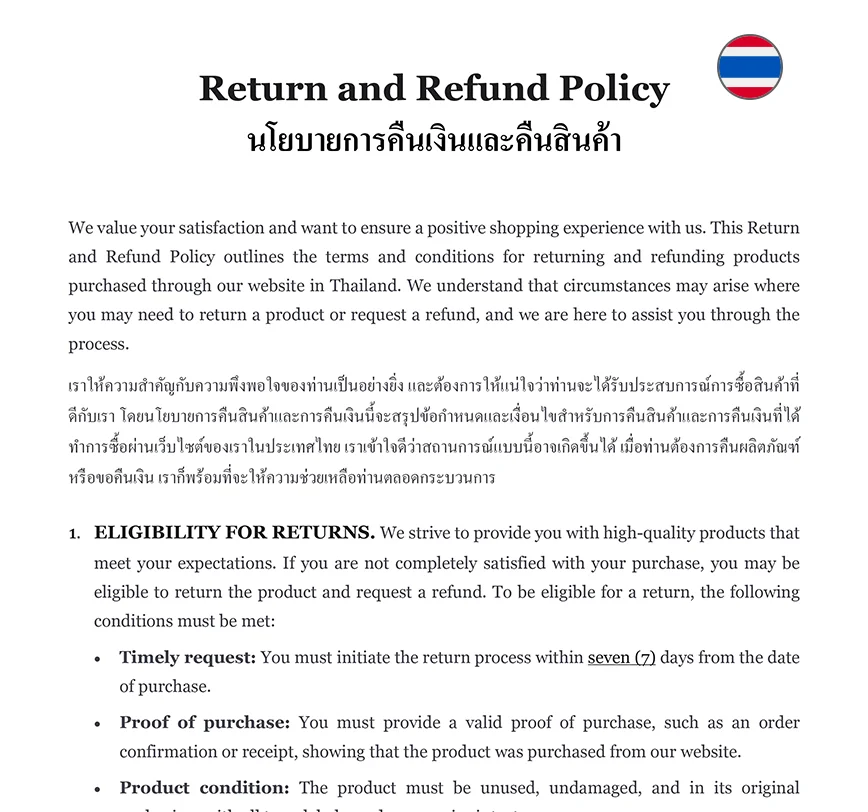Ready to use legal template
Drafted by experienced lawyers
Certified Thai-English translation
Ready to use legal template
Drafted by lawyers
Translated in Thai-English
Home › Intellectual property › Return and refund policy
Learn more about Return and Refund Policy
Navigating return and refund processes is essential for businesses in Thailand to establish transparent and trustworthy customer relationships. At Themis Partner, we recognize the significance of a well-structured Return and Refund Policy. Our platform offers a user-friendly legal template, expertly drafted by lawyers well-versed in Thai consumer protection regulations. This template provides a solid foundation to create a comprehensive policy that outlines customers’ rights, procedures for returns and refunds, and the responsibilities of both parties.
Table of contents
-
What is a Return and Refund Policy?
-
Why is a Return and Refund Policy important in Thailand?
-
Are there exceptions to the Return and Refund Policy?
-
What should a Return and Refund Policy include?
-
How does it ensure compliance with Thai consumer protection laws?
-
Is a Return and Refund Policy legally mandatory in Thailand?
What is a Return and Refund Policy?
A Return and Refund Policy serves as a crucial guideline that outlines the procedures and terms governing product returns and refunds for customers. This policy provides clarity on how your business handles instances where customers are dissatisfied with their purchases, ensuring transparency and a seamless customer experience. It details conditions for product eligibility, timelines for returns, refund methods, and any associated fees or charges.
By clearly communicating these procedures, this well-crafted Return and Refund Policy not only informs customers about their rights but also demonstrates your commitment to fair practices, fostering trust and loyalty among your clientele.
Why is a Return and Refund Policy important in Thailand?
A Return and Refund Policy holds immense importance in the context of Thailand’s consumer protection regulations. By providing a clear and transparent outline of how returns and refunds are managed, businesses demonstrate their commitment to adhering to Thai consumer rights laws.
This policy ensures that customers are well-informed about their entitlements, such as the conditions for returns, timelines, and refund methods. By aligning with Thailand’s legal framework, a robust Return and Refund Policy builds trust, mitigates disputes, and enhances customer satisfaction. Additionally, it safeguards businesses from potential legal complications, reinforcing their credibility and reputation in the Thai market.
Are there exceptions to the Return and Refund Policy?
Yes, Return and Refund Policies may include exceptions to address specific situations that fall outside the standard procedures. These exceptions could pertain to:
1. Non-returnable Items: Some items, such as perishables, personalized products, or digital goods, might be non-returnable due to their nature.
2. Limited Timeframes: If your policy has a specific window for returns or refunds, there might be cases where requests made after the stipulated period won’t be entertained.
3. Special Circumstances: Unforeseen circumstances, like damage caused by the customer, may be excluded from the policy’s coverage.
4. Promotional or Sale Items: Policies could have different terms for products bought during sales or promotions.
5. Service-Based Products: If your business provides services, your policy might have variations for refunds related to services.
6. Custom Orders: Custom-made or tailor-fitted items may have different return conditions.
7. Hygiene or Safety Concerns: Items like undergarments or health-related products might not be returnable due to hygiene reasons.
Clearly outlining these exceptions in your policy adds transparency and helps manage customer expectations effectively. However, it’s important to strike a balance between protecting your business’s interests and maintaining customer satisfaction.
What should a Return and Refund Policy include?
This well-structured Return and Refund Policy should encompass essential details to provide clarity and ensure a smooth process for both customers and your business. It should include:
1. Eligibility for Returns
Clearly state the conditions under which products can be returned, such as defects, damages, or incorrect items received.
2. Return Timelines
Specify the timeframe within which customers can initiate a return request after receiving the product.
3. Product Conditions
Explain the expectations for the product’s condition during return, like original packaging, tags, and unused state.
4. Refund Methods
Describe the methods through which refunds will be processed, whether through original payment methods or alternatives like store credit.
5. Return Process
Outline the step-by-step process customers should follow to initiate a return, including communication channels and required documentation.
6. Customer Responsibilities
Define the actions customers need to take, such as providing proof of purchase or securely packaging the item for return.
7. Exchanges
Clarify if exchanges for the same or different products are allowed and under what circumstances.
8. Refund Timeline
Communicate the expected time it takes to process refunds after the returned product is received.
9. Fees and Charges
By addressing these key aspects, your Return and Refund Policy promotes transparency, builds trust with customers, and helps prevent misunderstandings or disputes in Thailand’s consumer landscape.
If there are any fees associated with returns or restocking, these should be transparently disclosed.
How does it ensure compliance with Thai consumer protection laws?
A meticulously crafted Return and Refund Policy serves as a critical tool for ensuring compliance with Thai consumer protection laws and building trust among customers. By transparently outlining procedures, product eligibility criteria, refund methods, and customer responsibilities, the policy communicates a commitment to adhering to Thailand’s legal framework. It respects consumer rights, discloses accurate product information, and addresses unfair terms, while also considering data protection regulations.
This ensures that customers are informed about their entitlements, such as the cooling-off period, and prevents misleading claims. By aligning with Thai consumer protection principles, your policy establishes a solid foundation for ethical business practices and enhances customer relationships through transparency, fairness, and legal compliance.
Is a Return and Refund Policy legally mandatory in Thailand?
While a Return and Refund Policy is not explicitly mandated by law in Thailand, having a clear and comprehensive policy is highly recommended for businesses. This practice aligns with consumer protection principles and promotes transparency between businesses and customers.
By providing a well-defined policy that outlines return procedures, eligibility criteria, refund methods, and customer responsibilities, you establish a framework that complies with Thai consumer rights and expectations.
Although not legally mandatory, a well-crafted Return and Refund Policy showcases your commitment to ethical business practices, enhances customer satisfaction, and minimizes potential disputes, thus safeguarding both your business’s reputation and the interests of your clientele.
SPECIAL OFFER
eCommerce
5 Document Package
Essential website/app policies for online business in Thailand
Return and Refund PolicyTemplate (.docx)
Easy and quick to customize
310 client reviews (4.8/5) ⭐⭐⭐⭐⭐
Share information
Why Themis Partner?
Easy legal documents at your fingertips
Make trusted documents for hundreds of purposes.
Hundreds of documents
Instant access to our entire library of documents for Thailand.
24/7 legal support
Quick legal advice from our network of qualified lawyers.
Easily customized
Editable Word documents, unlimited revisions and copies.
No translation fees
Certified Thai-English translation included for all documents.
Legal and Reliable
Documents written by lawyers that you can use with confidence.
Free consultation
Free lawyer consultation on each new matter.




